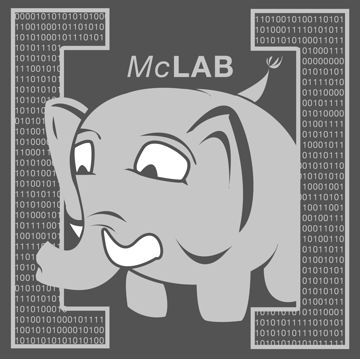MiX10
Overview
X10 (a recursive acronym for Mix10 Isn’t X10) is an open MATLAB compiler that ports MATLAB programs for efficient execution on high performance computing systems by translating them to IBM’s new-age high performance computing languge, X10, which in turn compiles to more commonly used languages, C++ and Java.
MATLAB is a very popular dynamic array-based language commonly used by students, scientists and engineers, who appreciate the interactive development style, the rich set of array operators, the extensive builtin library, and the fact that they do not have to declare static types. Even though these users like to program in MATLAB, their computations are often very compute-intensive and are better suited for emerging high performance computing systems.
X10, on the other hand is an award-winning language designed for “Performance and Productivity at Scale” and is well suited for emerging high performance computing systems. X10 is based on four basic principles of asynchrony, locality, atomicity, and order developed on a type-safe, class-based, object-oriented foundation. The X10 compiler can generate C++ or Java code and supports various communication interfaces including sockets and MPI for communication between nodes on a parallel computing system.
With MiX10, our aim is to provide MATLAB’s ease of use, to benefit from the advantages of static compilation, and to expose scalable concurrency. MiX10 project makes it feasible for scientists and engineers to write programs in MATLAB (or use existing programs already written in MATLAB), and at the same time enjoy the benefits of high performance computing via the X10 system without having to learn a new and unfamiliar language. Also, since the X10 compiler has back-ends that can produce both C++ and Java, MiX10 can also be used by systems that use MATLAB for prototyping and C++ or Java for production.
MiX10 provides an efficient translation for sequential core of MATLAB by addressing the challenges of: 1) Mapping programming constructs of a matrix-based, dynamic and “wild” language to those of a statically typed and object-oriented programming language, 2) Providing support for a huge number of MATLAB builtin methods that are a major reason behind its success as a scientific programming language and 3) Efficiently translating MATLAB matrices to different kinds of X10 arrays. MiX10 also provides an effective bridge to X10’s concurrency features by 1) designing and implementing an effective translation of MATLAB’s parfor construct to X10, 2) Providing a way to execute vectorized instructions concurrently and 3) By introducing concurrency constructs in MATLAB analogous to those provided in X10, thus allowing users to further specify fine-grained concurrency in their programs.
MiX10 is developed as a part of Vineet’s M.Sc. thesis. He finally finished his thesis in the Winter of 2014 with an “Excellent” review from the external reviewer.
IntegerOkay Analysis
One of the key contributions of the MiX10 project is the IntegerOkay analysis. All the numbers in MATLAB are by default of type double. For a target language like X10 (also C++ and Java), certain uses of numerical values, for instance, as an array index, require the value to be of an integer type. A typecast operation from double to integer is a costly operation due to the value checks involved in it. The IntegerOkay analysis identifies those numerical values that can be safely declared to be of an integer type at compile time. Read more details about the analysis here or just check out the algorithm here.
Evaluation
A detailed evaluation of the MiX10 compiler can be read here.
People
Publications
- Thesis: MiX10: Compiling MATLAB to X10 for high performance
- Technical Report: MiX10: Compiling MATLAB for High Performance Computing via X10
- Technical Report: First steps to compiling MATLAB to X10
- Lecture: MiX10 Lecture At CASCON
Software
The alpha release of the MiX10 compiler is now available. You can download it here. A step-by-step documentation for getting started with the downloaded file is available in PDF format here.
Note: The above document corresponds with the source code available above and may not be
completely compatible with the latest source code. If you intend to use the latest source code,
make sure to check the README.md file with it and run with --help for more information.
Source Code
McLab is open sourced under the Apache 2.0 license. The source code for MiX10 is still brewing and a complete and stable release will be made soon. In the mean time you can see what’s going on under the hood (and maybe get your hands dirty too) at our GitHub repository.
